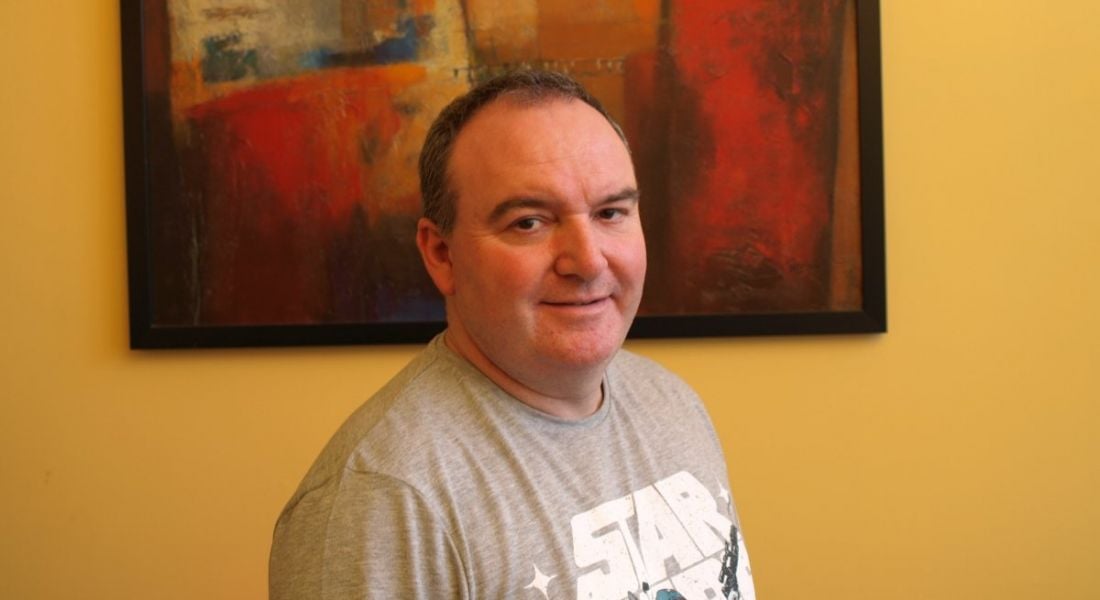Have you ever wanted to start over? Wish you had decided to be something else? Where would you begin?
It can take a lot of courage to make a career change late in life and to start fresh as a graduate, but some programmes make it easier than others.
Bernard Ellis, a graduate working at Intel, tells us about the work he does with the tech giant, and what it was like to switch focus after 18 years in aviation.
What did you study in college?
Manufacturing technician maintenance skills, supported by Intel and run in conjunction with Fastrack into IT and Cenit College. It’s a new course designed by the Education and Training Board, consisting of eight modules – industrial electrical systems, electrical principles, electronics, maths for IT, programmable logic controllers, mechanical maintenance skills, robotics and communications, as well as a City and Guilds portion – running full-time for a year.
With this programme, are you now working in your desired industry?
Yes. I started in Intel as a graduate technician, but the course also caters for a wide range of industries such as biopharma, pharma and food processing.
What drew you to this company when you were seeking work as a graduate?
Intel is one of the most innovative and modern companies in the world, and is a great place to learn and work.
Intel is a world leader, not just in this field, but also in the use of statistical process controls – such as Lean Six Sigma – that I used in my previous job as an aviation jet engine repair technician. However, as the aviation sector downsized, I needed a new approach to upskilling and this company and the course really suited my needs.
What expectations did you have before you began the programme?
My goal was always to attain a technical qualification and a full-time career at Intel. Having reached my mid-40s, and after working in aviation for 18 years, my expectations of employment in a new industry were challenging to say the least, but the programme gave me the confidence and skills boost that I needed.
What duties and responsibilities were you given initially?
My role is wafer-handling process technician. I work on preventative maintenance, and wafer handling and recovery. A lot of web-based training on the job and instructor-led training were also required, in conjunction with my new certification.
But you quickly adapt to the process and become a member of the team, with your own contribution to the process.
Did the scope of your work change as the programme progressed?
Yes, the work scope increased as my confidence and familiarity with the processes grew, allowing me to face challenges and increase my knowledge of the equipment. The buddy system was a great way to learn and reduced the stress that a newbie can feel for the first few weeks.
Can you describe a typical day in your role?
At the start of shift, we have a pass-down with the previous shift, detailing problems solved and potential problems for the coming day. Then, a meeting with my GL and team to discuss current outstanding shift problems, delegation of work orders and any PMs that are required, prioritising tools for repair depending on downtime.
I also liaise with the engineers for any technical updates and difficulties, and interpret graphs of cycle times and out-of-control tools that need to be brought back into the sigma rules.
The day is busy, with a lot of phone calls and alerts on various tools that need to be remedied. As such, the day goes fast and challenges change from day to day, always keeping you busy. When a problem is solved, either by myself or collectively, it always makes you feel good to be part of the group. The GLOBO (rewards system) and other bonus systems are a great way of recognising your achievements and the company’s performance.
Lunch in the restaurant is always a good laugh with the rest of the team. The food is excellent and the freebies are a great perk.
At the end of shift is the pass-down to the next shift, and this can take half an hour or so to compile. There’s always joking and banter between shifts, and you can go home happy – well, most of the time.
How do your responsibilities compare to more experienced employees’?
My short time at the company of course means that I am limited in my participation, but I feel my input is valued, even if I am less experienced in this process. A new perspective is always appreciated at Intel.
Do you feel more prepared for working life after completing this programme?
The programme was a new direction for my career. I had worked many years in jet engine maintenance, but it had been more than 25 years since I had finished my trade at DIT, and it did take some adjustment to reteach myself and have the self-belief that I could compete for a career with my peers.
Why should someone apply to the graduate programme at this company?
This programme will challenge the abilities of most but, if you persevere, the benefits and rewards are there at the end. I doubted my own abilities to complete this programme, but if I can do it, then so can anyone.
As a member of Intel, the lifelong learning continues and the limitations are your own. The directions your career can take and the opportunities available are truly limitless, so you never feel that your career has peaked. I look forward to a long and happy work-life balance here.




